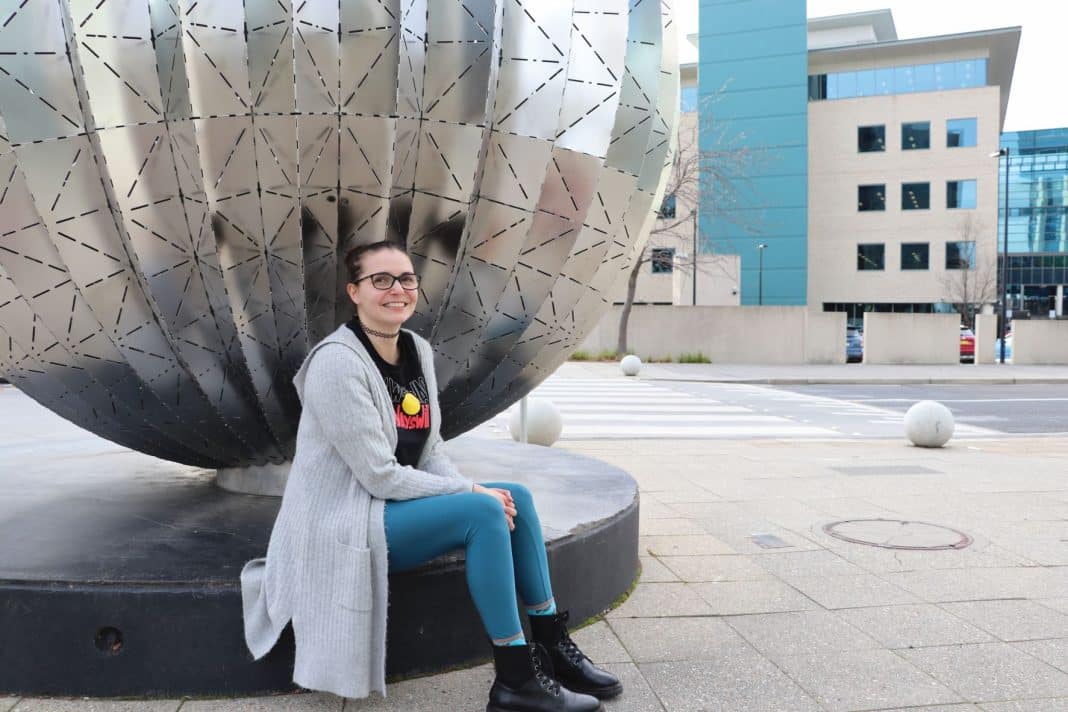Alinta Barlow is a part of the Winanggaay Ngunnawal Language Group, who are dedicated to reviving the Ngunnawal language. Together, they’ve been working on the project since 2019, researching the language and speaking to elders. The group has grown to the point where some members are able to teach language to others through workshops.
One of the most important aspects for Barlow is the opportunity to connect with members of the community she otherwise might not have been able to; that and the fact she is now able to incorporate Ngunnawal language into her song writing and translate songs into language. So far, the group has translated one song: My Island Home.
“It’s a beautiful song but the band who originally wrote it, the Warumpi Band, and Christine Anu are more linked to the saltwater people. We’re not necessarily saltwater people; it would be nice to write our own stuff, to have that on our own,” Barlow said.
Late last year, acclaimed singer and director of the National Folk Festival, Katie Noonan, floated the idea to the group, having done the same thing with other Indigenous communities. They were excited by the prospect and got to work translating; once complete, Barlow performed the song and Noonan suggested she perform it at this year’s Festival.
Barlow believes any Australian or Indigenous person can to relate to the song, although she clearly remembers hearing Christine Anu’s version as a child.
“I was like ‘Mum, that’s an Australian Indigenous woman who’s out there doing music and that’s what I want to do’.”
Barlow recalls singing her entire life; car trips with her mum, providing harmonies for a friend in high school, and beginning her own career. She wishes singing was her full-time occupation, but at this point it’s not sustainable, and she also teaches at CIT focusing on cultural arts.
It is through her mother that Barlow has a connection to the Ngunnawal people. Her mother’s birth parents were a Ngunnawal man and a Wiradjuri woman, and although her mother was adopted, she was able to re-connect with her birth family in her adult years. As a family, they have found a deeper connection with people from Ngunnawal country.
This connection provided her with the opportunity to meet her pop, Eric Bell, who was a prominent figure in the Yass community where their Ngunnawal clan came from, the Wallabalooa people. Meeting an important part of their family and community allowed them to learn more about their history and embed themselves in their culture.
“A lot of Aboriginal families are like this; children are separated for one reason or another and it’s common to go ‘I want to find my family, I want to find my clan, I want to find my mob’ basically, and the sense of culture comes from the sense of family and the sense of belonging.”
The singer-songwriter is working towards her goal of being able to perform her own songs in full Ngunnawal language, noting it’s challenging as there are words that either never existed in Ngunnawal or have simply been lost to time.
What to do when there isn’t a word to describe something that may have not existed at the time when the language was spoken is just one of the many challenges that come with the revival. Barlow explained this is where a group of talented linguists comes in.
“They’ve done the research, they’ve got the knowledge and they gave us the idea to look to what other Aboriginal languages have done; and we can see that for words that didn’t exist, we have been able to create words from existing ones.”
Ngunnawal language is not an easy one to learn, the composition being very different from English and most other languages. Barlow explained that sentence structure in Ngunnawal is vastly different from what is taught in Australian schools; a short sentence often being translated into a long single word with additional suffixes.
“There are two birds there, it would probably be one word like bird is budjan and if you wanted to make it two birds you would say budjan-bulla and it keeps going.”
Barlow believes it’s important to recognise there will be some limitations on how non-Indigenous people will be able to use the language, although she appreciates when someone makes the effort to learn ‘Yuma’ to say hello or deliver an acknowledgment of Country in language.
“People learning the acknowledgment in language means they have taken the time to look at what the Aboriginal people of this land want.”
Expecting the process to be a slow one, the group is asking those invested to be patient as most of the language has been lost over time. In addition, they are having to deal with issues like intergenerational trauma that surrounds its use, and the fact that they are only a small group working on the project.
The Group recently became a corporation, which means they will be able to access more resources to assist with the revival. Their first goal, as Barlow sees it, is to ensure the next generation of Ngunnawal people can understand and speak the language.
“Language is such an important part of culture, so being able to speak our language again would mean great things for Ngunnawal people.”
While all Ngunnawal people are encouraged to be involved with the initiative, Barlow says the group understands some may not want to; they just want them to know resources are available if they choose to come along and learn.
Audiences are invited to hear Barlow perform when she takes the stage as part of Floriade’s Nighfest program on 29 September.
You can follow Alinta Barlow’s music on her Instagram page; instagram.com/alinta_music
Get local, national and world news, plus sport, entertainment, lifestyle, competitions and more delivered straight to your inbox with the Canberra Daily Daily Newsletter. Sign up here.



